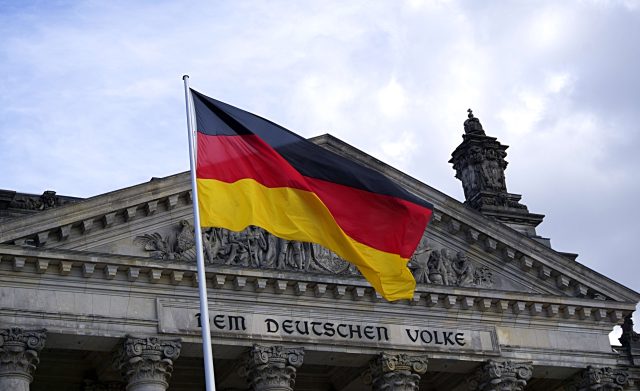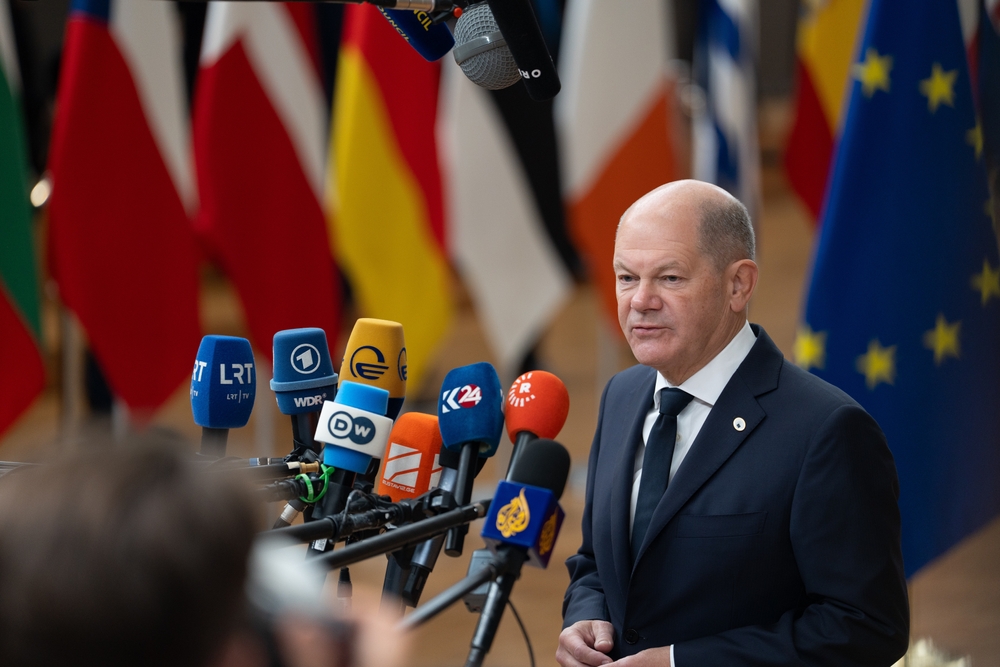
Parties’ Plans to Rescue the “Sick Man of Europe”
On February 23, 2025, Germans will head to the polls in a highly anticipated federal election that will determine the future course of Europe’s largest economy. Triggered by the collapse of Chancellor Olaf Scholz’s coalition government, these early elections come at a pivotal moment, as Germany grapples with economic stagnation, political fragmentation, and growing societal tensions.
Often considered the economic engine of Europe, Germany now finds itself at a crossroads. The term “Sick Man of Europe,” once used to describe Germany in the late 1990s, has resurfaced in political discourse, highlighting the country’s current struggles. The combination of economic decline, social unrest, and political polarization has raised questions about Germany’s ability to maintain its role as a pillar of European stability.
 The Fall of the Scholz Government: A Fragile Coalition Breaks Apart
The Fall of the Scholz Government: A Fragile Coalition Breaks Apart
The Scholz administration, formed in 2021, was based on an uneasy alliance between the Social Democrats (SPD, S&D), the Free Democrats (FDP, RE), and the Greens (Grünen, Greens/EFA). From the outset, this “traffic light coalition” was marked by ideological differences and diverging policy priorities.
The tipping point came over a €15 billion aid package for Ukraine, which exposed the fractures within the coalition. Chancellor Scholz dismissed Finance Minister Christian Lindner (FDP, RE) after heated disputes over fiscal policy. Lindner opposed additional debt to fund the aid, advocating for fiscal discipline in line with Germany’s constitutional “debt brake.” This rift culminated in a failed confidence vote in the Bundestag, forcing Scholz to call early elections.
The coalition’s collapse reflects deeper tensions within German politics, particularly regarding the balance between social spending, economic stability, and foreign policy commitments. The inability of the government to present a unified stance on crucial issues has not only weakened Germany’s internal cohesion but also its standing on the international stage.
The Economy: A Crisis at the Core
At the heart of the electoral debate is Germany’s faltering economy. Once a symbol of resilience and efficiency, the German economy has entered a phase of stagnation, with the GDP contracting over consecutive quarters. The decline of the automotive industry—a cornerstone of the nation’s economic prowess—has been particularly damaging. The sector employs nearly a third of the German workforce, directly or indirectly, and its struggles have had ripple effects throughout the economy.
Global competition, especially from China’s electric vehicle market, and stringent EU environmental regulations have put immense pressure on German automakers. As factories close and layoffs mount, entire regions are experiencing economic decline. Moreover, energy costs have surged following the government’s decision to shut down nuclear power plants, leading to a renewed dependence on coal and imported energy—a controversial move that has sparked heated debates on Germany’s energy transition strategy.
The leading parties have presented contrasting economic recovery plans. The Christian Democratic Union (CDU, EPP), led by Friedrich Merz, proposes tax cuts, deregulation, and investments in traditional industries, aiming to revive the manufacturing sector. Merz has criticized the “ideological rigidity” of the Greens’ energy policies, advocating for a more pragmatic approach that includes re-evaluating the nuclear phase-out.
On the other hand, the Social Democrats and Greens emphasize green energy and digital innovation, proposing subsidies for renewable energy and investments in sustainable technologies. However, critics argue that these plans are unrealistic given the current fiscal constraints and Germany’s growing debt.
Immigration and Security: A Divisive Issue
Immigration has emerged as one of the most contentious topics of the campaign. Germany remains one of the primary destinations for migrants and refugees in Europe, leading to mounting public concerns over integration, security, and social cohesion.
Europe, leading to mounting public concerns over integration, security, and social cohesion.
The Alternative for Germany (AfD, ESN) has capitalized on these anxieties, advocating for strict immigration controls, mass deportations of undocumented migrants, and a reevaluation of Germany’s asylum policies. The party has gained significant traction, particularly in eastern Germany, where economic hardship and social alienation have fueled resentment against the political establishment.
In late January, the Bundestag held a critical vote on tightening immigration policies. The CDU and AfD voted together on several amendments aimed at restricting asylum applications and increasing deportations of migrants with criminal records. Although CDU leaders were quick to dismiss any suggestion of post-election cooperation with the AfD, the vote has sparked controversy, raising questions about the mainstream right’s willingness to adopt tougher stances on immigration.
The issue of security has further intensified following recent terrorist attacks at the Christmas market in Magdeburg and a city festival in Solingen. These incidents, linked to Islamist extremists, have reignited fears of homegrown terrorism and exposed gaps in Germany’s counterterrorism measures. Public sentiment has shifted towards favoring stricter border controls and enhanced surveillance, putting additional pressure on centrist parties to adopt more robust security policies.
Foreign Policy: Germany’s Global Role in Question
Germany’s foreign policy has also become a focal point of the election, particularly regarding its relationship with the United States, NATO, and Russia. With the war in Ukraine entering its third year, debates over military aid and sanctions against Russia have polarized the political landscape.
While the CDU and the Greens advocate continued support for Ukraine, the AfD has called for re-establishing diplomatic ties with Russia, arguing that sanctions have harmed Germany’s economy more than they have pressured Moscow. This position has been met with criticism from across the political spectrum, but it resonates with segments of the population frustrated by rising energy prices and economic stagnation.
The election will also test Germany’s approach to the transatlantic alliance, especially under the renewed leadership of U.S. President Donald Trump (GOP). Trump’s “America First” policies and criticism of NATO burden-sharing have strained relations with Europe, pushing German policymakers to reconsider the country’s defense strategy and its role within the alliance.
Energy Policy: Between Ideology and Pragmatism
Germany’s energy transition remains one of the most polarizing issues in the campaign. The decision to phase out nuclear power has been widely criticized for exacerbating energy shortages and increasing reliance on coal—an outcome that undermines Germany’s climate goals.
The Greens continue to champion renewable energy, pushing for aggressive investments in wind and solar power. However, their plans face logistical challenges, public opposition to new infrastructure projects, and concerns over grid stability.
The AfD has taken a radically different stance, calling for the dismantling of wind farms and a return to fossil fuels and nuclear energy to ensure energy security and affordability. The CDU, meanwhile, advocates for a balanced approach, including the potential reactivation of modern nuclear facilities and investments in cleaner fossil fuels, such as natural gas.
The Electoral Landscape: A Fragmented Political Arena
According to the latest polls, the CDU/CSU alliance (EPP) is projected to lead with around 30% of the vote, securing between 200 and 250 seats. However, this would still leave the party short of the 316-seat majority needed to govern alone.
The potential collapse of the FDP, which risks falling below the 5% electoral threshold, has further complicated coalition scenarios. The most likely outcomes include:
- A Grand Coalition (Große Koalition) – A renewed alliance between the CDU and SPD, though less popular among voters, could offer stability.
- A CDU-Greens Coalition – An unprecedented but possible partnership, despite ideological differences, particularly on economic and energy policies.
- A Minority Government – With limited coalition options, the CDU may consider governing with external support from smaller parties on specific issues.
The AfD is projected to secure approximately 150 seats, solidifying its position as the second-largest party. Despite its electoral success, all mainstream parties have ruled out formal cooperation with the AfD, citing its radical positions.
Youth, Society, and the Future of German Democracy
The role of youth and families in the upcoming election cannot be understated. Christian youth associations have urged parties to prioritize policies that support children, education, and family welfare. At the same time, the rise of far-right youth movements, such as the Patriotische Jugend, highlights the growing polarization within German society.
Germany’s electoral system, which includes both proportional representation and direct mandates through first-past-the-post voting, adds another layer of complexity. In districts where vote splitting occurs, the AfD could secure significant victories, increasing its parliamentary influence even without broader national appeal.
Moreover, the spread of disinformation and fake news, particularly on social media, poses a significant threat to the integrity of the democratic process. Efforts to combat these challenges will be crucial in ensuring a fair and transparent election.
Conclusion: Germany at a Crossroads
The 2025 federal election represents a defining moment for Germany, with implications that extend far beyond its borders. As the country grapples with economic stagnation, societal polarization, and shifting global alliances, the path it chooses will shape not only its own future but also that of Europe as a whole.
For the European Union, Germany’s stability remains a cornerstone. A strong, pragmatic government in Berlin is essential for addressing the continent’s challenges—from economic recovery and energy security to immigration and foreign policy. As the “Sick Man of Europe” label looms, the upcoming election offers Germany a chance to reaffirm its leadership or risk deepening the crises it faces.



 Subscribe
Subscribe